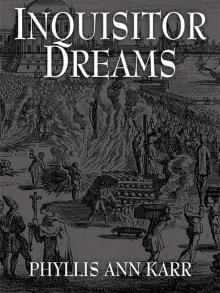- Home
- Phyllis Ann Karr
Inquisitor Dreams Page 16
Inquisitor Dreams Read online
Page 16
Meanwhile, finding the holy city as much as ever a haunt of unholy knavery, Don Felipe rejoiced that he had prudently left his Italian servant at home to care for his properties in Aragon, well removed from the temptations of earlier years.
Although he could not avoid an inward chuckle of regret on meeting the canon of Eymstadt. Gubbio’s moist, warm, earthly humors rubbing against this canon’s cool, dry, celestial ones must surely have provided ample entertainment for the longest journey!
The canon was staying in an Augustinian house far too reformed for the comfort of the secular priest’s body, spirit, or digestion. Don Felipe elected to remain in the home of one of the pope’s favorite cardinals while completing his arrangements for the mission. The canon, professing himself ready to depart at once, raised a thin brow and cited Ihesu’s words to the Apostles to “carry nothing” for their travels; but Don Felipe—already weary from the trip across Aragon, Catalonia, and the Mediterranean to Rome, and facing a far longer and more arduous journey to Ireland, cited the duties of a guest to his host and the need for a papal legate to furnish his mind with certain additional study of precedents and analogous situations, which could be done only here in the libraries of Rome. Diplomatically, he forebore to point out that his future traveling companion had already enjoyed a considerable respite from the road while presenting his case to the pope’s penitentiary.
Emerging from a visit to his Italian bankers, Don Felipe thought he felt the wickedness of the city brush his own person in the form of a young cutpurse. Catching the boy by one scrawny arm, he pulled him face to face and demanded, “Well, lad, do clerical purses make thieves the best pickings, here in Rome?”
“Not a thief!” the boy protested, anger seeming to war strangely with terror in his countenance.
Without loosing his hold, Don Felipe groped one-handed for his purse and found at its top a folded paper that had not been there before. Intrigued, he drew it out and worked it open. It was scribed with the name of a certain house in the Jewry, and the words, “Come as if buying.” Years fell away as Felipe recognized the hand.
Nodding, he released his young captive—who promptly dodged into the crowd—and made his way to the Jewry, rejoicing that the lad had found him alone: having spent much of the morning at his researches, he had given the old familiar and former soldier, Luis Albogado, whom he had brought with him as manservant in Gubbio’s place, an errand elsewhere.
Half an hour later, Felipe found the building. Even as he began to investigate the shops of its arcade, he caught sight of a familiar figure standing at the far end. No sooner had he opened his mouth to call a greeting, than Gamito nodded and vanished into his shop.
Wondering, but slowing his steps with an effort, Don Felipe proceeded to the spot where he judged his friend had stood, and entered in his turn. It proved to be a tiny pawnshop, a place of antiquities and modernities, velvets and brocades, books and musical instruments, all cleanly stored in such a manner as to show without ostentation. Felipe’s old friend sat behind the small counter, studiously turning the pages of a book after the Hebrew fashion, left to right.
“Gamito!” Felipe exclaimed.
The other looked up with an almost imperceptible shake of his head. Glancing at the door as if through his visitor, he said, “Your Reverence mistakes me for someone else. But if you please to come closer, I may have some trinkets here to interest you.”
Stepping to the counter, Don Felipe lowered his voice in deference to his friend’s obvious wishes. “I have mistaken no one. My God! Gamito, finding you answers my most heartfelt prayer!”
“And mine,” Gamito murmured, rising from beneath the counter, where he had bent to retrieve a small coffer. Placing it on the surface between them, he opened it and said more loudly, “If it is antiquities your Reverence seeks, I can offer a fine denarius from the time of the second Caesar, or even an obol from Plato’s Athens, though this last has been with me but two days past its promised time of redemption.”
“I will look at them both, and at anything else you may care to show me, but why this secrecy? Has the city’s spirit of intrigue infected even you, Gamito? Or is there truly some need, some danger—”
“None of which we know,” Gamito murmured reassuringly. “No, we have been made welcome here, by both his Holiness and our own Roman compatriots. But a Jew learns caution. Overmuch caution, perhaps—even, at times, a caution that may seem ludicrous to a free Gentile—but our fathers had been welcome in Spain for many generations, and now there is talk that this same pope who welcomed us is about to honor Fernando and Isabel officially with the title of ‘Most Catholic,’ for their Christian charity in exiling us.”
“Among other deeds,” the priest added, “including the glorious reconquest of Karnattah, with its rape of our beloved Alhama.” Hearing the bitter notes in his own voice, he added, “But his Holiness must tread a razor’s edge of diplomacy, Gamito, if he would keep any control at all over rebellious Spain. And, for the sake of that God Whom we both worship, let there be no more talk of ‘Gentile’ or ‘Jew’ between us two!”
“Do you chide me,” his friend inquired, “for the pains I have been at to protect your name among your own kind?”
Taken somewhat aback, Don Felipe pondered a few moments before answering slowly, “No, old friend, I thank you. These are not the habits I have learned in Aragon of late years. There, I ventured not even to inquire of the banker where—and if—your letters of credit had been presented, lest my interest should be known to concern more than my own newly acquired properties. Being in Rome again, I seem to breathe once more the freer air of my youth. It may have made me reckless.”
Over the coffer of antiquities, Gamito’s forefinger found the back of Felipe’s hand and rested there for a heartbeat or two. “As Spain made us cautious,” he repeated softly. “If your pope walks the edge of a razor, so do we—and, I think, a sharper razor than his! But I thank you, old friend. Your purchase of our property—at a price more than fair, when so many other good Christians were fattening themselves upon our need—and payment in letters of credit upon the Fuggers, rather than in specie which we would have needed to smuggle from the country with great risk of confiscation, made this shop and our livelihood from it possible.”
“I rejoice in your welfare,” the priest said sincerely. “And all of you are safe?”
“All of us, although the exodus from Spain nearly killed my dearest wife, who was big with our firstborn. No blame to you, my friend, and Heaven’s blessing upon those few who laid aside their Christianity, at great risk to themselves, long enough to offer us a little help along the road.”
“No, Gamito, theirs was the true Christianity, the mercy which our Lord enjoined upon His followers—but you see, I say to you, here in Rome, things that not even a holy inquisitor would dare say aloud in the Spain of Fernando and his Castilian queen!”
“Perhaps you should not whisper them even in Rome. Who knows what Christian ears may overhear, what side of the razor’s edge your pope may land upon when he falls?”
“I will buy both obol and denarius for a visit with you in your home, where we may talk more freely than even here.”
“Felipe, both coins are yours for my great pleasure in seeing you again, but appear to haggle a little while longer. I think it safest to converse quietly here, rather than that any eyes should glimpse you seeking out a Jewish household.”
“I have already set inquiries in motion for you and your family. Of all people in Rome, I judged my bankers best suited to the task. But how could even they have worked so quickly? That lad slipped me your message on my way out of the bank.”
“My brother saw you at the wharf on your arrival.”
“Truly? I did not see him.”
“Thinking it more prudent that you should not, he stayed hidden in the crowd. He was there to collect certain merchandise for the good man who lodged my mother and sister when first they fled here to join my brother’s family. As for the boy, he i
s a street urchin, but recommended by an acquaintance who has found him trustworthy on errands of a delicate nature.”
Felipe sighed. “Have you ever thought, Gamito, that this ‘New World’ beyond the ocean may offer your people a second Promised Land?”
“But you frown, my friend,” said Gamito.
“No—it is nothing—only some vague fancy of having once seen something of the sort in a dream. Long ago…very long ago, if, indeed, it ever occurred at all.” Unable to plumb his memory for further details, Felipe shrugged it off and went on, “But see here, Gamito. Why, when I have already begun inquiries for you through the Fuggers, should I not visit you in your home?”
“Bankers, even Gentile bankers, can guard confidences very well.”
Better, perhaps, than Spanish priests! Don Felipe reproached himself on two counts, remembering both his great sin and his own failure to question his bankers in Aragon concerning the whereabouts of his Hebrew friends. “But I am forming a resolution: invite me into your home, and upon my return to Aragon I will enter into correspondence with you through my bankers.” Seeing his friend’s hesitation, he added, “If need be, I shall pretend an effort to convert you, mixed with sufficient pious sentiments to satisfy prying eyes. You will know how to crack through them for the true meat of my letters.”
“I will, indeed!” With a low chuckle, Gamito accepted the handclasp Felipe offered over the antique coins. “You will find us a stubborn family, Felipo, and very difficult to convert, but any letter you dare send will be welcome for its own sake. Ask for us in the street of the fishmongers.”
* * * *
By the time all preparations for the mission to Ireland were completed, leaving no further excuse for delay, Don Felipe had enjoyed no fewer than three visits with his old friend. By going quietly but not furtively, he felt that he had attracted little if any comment; and the late hardships suffered by the Hebrew family while still in Spanish lands had in no way impaired its cooking.
They queried each other about their third boyhood friend, but Gamito had learned no more than had Felipe about Hamet and his family. They could but hope that the Moors were safe somewhere and living in comfort, Morayma with the husband to whom she had long ago been married, and Hamet, perhaps, with his own little harem.
(Not even to Gamito would Felipe speak of his love for the lady lost to him forever. How could he speak of it, even to God, without remembering the great sin with which he had dishonored his devotion? He cringed to think how Morayma would have viewed his secret disgrace; for, while her people might not understand the Christian sacraments, they had their own strong sense of honor and religion. As things stood, she might never have so much as suspected Felipe’s adulation. It was better so.)
Nevertheless, two of the old comrades had reunited, and when they parted again, it was with promises to maintain contact with letters exchanged through the bankers.
* * * *
Those letters must wait, of course, until Don Felipe was back in Aragon; or, at least, until he had parted with the canon of Eymstadt, who was likely to lend him scarcely enough peace and solitude to read his Office during what small leisure the rigors of travel might allow.
Their party was small, very small. His holiness insisted that two Roman guards accompany them in addition to the old soldier Luis Albogado, but agreed, after raising one fine if heavy eyebrow briefly at Felipe’s failure to bring along a Spanish chaplain, that legate and canon might provide each other as well as their three men-at-arms with the comforts of Mass, Confession, and holy counsel when required.
Don Felipe had neglected to bring a chaplain along with him precisely because of his deeply private plan to unburden himself to some chance-found parish priest far from either Spain or Italy. Life was uncertain, especially upon a journey to the end of the civilized world, and the canon of Eymstadt would be preferable to the demons of Hell; but, granted time for any other choice whatever, Don Felipe would as soon have made his crucial Confession to the inquisitor general of Spain—Fray Tomás de Torquemada himself—as to this educated Augustinian zealot who had deliberately abandoned the cloister with its library for the austere hardships of life as a mendicant friar.
Who seemed, moreover—to his companion’s discomfort—already to suspect that some heavy weight lay in Don Felipe’s soul. The first day that they stood side by side aboard the ship from Rome to Narbonne, the secular priest began, speaking in the one language that both clerics understood, “Tell me of your experience at this place called Saint Patrick’s Purgatory.”
“Was not my report among such papers and documents as need required you to study there in Rome?”
“It was,” Don Felipe agreed mildly, “but spoken testimony, for which written merely substitutes, is always to be preferred.”
The canon stared at him with piercing pale eyes and said in tones just barely on the right side of civility, “Is this your training as inquisitor?”
“In part, it is my experience—rather than training—but in larger part, it simply follows Holy Church in her ancient wisdom, which advises Scripture to be imparted and expounded orally wherever and whenever possible.”
With this, no churchman who had chosen the itinerant life could well argue. After a moment, the canon coughed, turned his gaze to the waters of the Mediterranean, and said bitterly, “I found it all lies, imposition upon popular credulity, and blatant simony.”
“You must explain more fully, and in proper order.”
Again the stare that seemed to pierce through Felipe’s body into his soul. “Do you interrogate me in your capacity of inquisitor?”
“I serve Holy Church as one of her inquisitors,” Don Felipe answered, remaining calm with some slight effort, “and it is for that reason, among others, that his holiness has named me to this our present mission. But I question you in your capacity of accuser and witness, not as one himself under suspicion.”
“Well and good! You have enough of them to suspect, hypocrites and simonizers all, every last one. When first I came to Saint Patrick’s Purgatory, and thought myself at my goal, Terence—in their own language, ‘Turlough’—Maguire, who is prior and presider of that so-called ancient holy place, claimed to require consent in writing from his bishop before permitting me to enter. All part of their fraudulent game, as I finally came to see, but meanwhile behold me duly seeking out his Excellence Cathal Og MacManus, whose servants treated me in my poverty as so much dirt. Does this befit those who claim to serve our Lord, poor as He was in His earthly life?”
Privately musing that the canon’s tone betrayed as much contempt for the bishop’s servants as they could possibly have shown him, Don Felipe shook his head in sympathy and prompted his informant, “But they finally admitted you to see Bishop Cathal?”
“They thrust me prone before him with jeers and mockery. And he—this high churchman boasting his true service to our Lord—demanded money for his written consent to enter his saint’s Purgatory!”
“On what grounds?” inquired Don Felipe.
“On grounds that such was his due from any who entered that place of supposed vision and pilgrimage! But in obedience to our Lord, Who commanded His disciples to carry no purse in their travels, I had no money, and even if I had, I would not have dared to pay, on account of simony and its contagion. So at last, yielding to my long arguments and tears of devotion, his excellency vouchsafed me his letters of admission, but sent me to his highness Nellanus MacGrath, secular prince of that territory, on grounds that I must have his permission as well.”
“Perhaps amicable cooperation,” Don Felipe mused, “or perhaps unseemly truckling to secular authority.”
The canon indulged in a sneer. “Ah, it was amicable cooperation! Completely amicable cooperation between spiritual arm and secular—both at work to reap profit from pious deluded pilgrims. For what does his highness demand of me, but money! Enough money to have made up for his churchman friend what I had refused to pay there.”
“But eventually you
prevailed upon Prince Nellanus MacGrath, also, without rendering payment.”
“Without payment of money, but with long payment of tears, pleading, argument, and even threats—pointing to his excellency’s permission, gained without coins. So back at last I returned, with both their letters of admission, and on reading them, what does Prior Terence demand but money in his turn, as ‘customary payment’?”
“It is unfortunately true,” Don Felipe observed, “that without alms, no steward can long maintain any shrine in this imperfect world. Does not Saint Paul himself command us not to muzzle that ox which treads our grain?”
The canon snorted. “It is one matter to collect alms offered in free generosity, as much or as little as their givers can afford, and another matter to fix some certain sum and call it ‘customary,’ as if God’s grace could be purchased for any set fee. That is what I call blasphemous simony!”
“You call it well,” Don Felipe conceded. “Yet, for all that, this prior may have been guilty of no more than thoughtless adherence to long custom as convenient guide. He did admit you finally, did he not, without payment?”
“Oh, aye, he admitted me, more grudgingly than freely, even deigning to hear my Confession and give me Viaticum—as if his mouth were worthy to grant absolution, or his hands to fondle our Lord’s sacred Flesh—”
“Such sacraments,” Don Felipe protested with a secret cringe, “remain equally valid, no matter any individual priest’s state of soul.”
“That is matter for debate,” the canon replied, his own opinion evident in his tone of voice. “In any case, thus prepared and fortified—in all good will on my own part, at least, if not on that of this prior—I followed him to that deep pit they call Saint Patrick’s Purgatory, into which his sacristan lowered me by rope, along with bread and one small flask of water, and left me therein all night in perfect comfort, expecting demons and visions in plenty and never seeing as much as one!”

 The Gallows in the Greenwood
The Gallows in the Greenwood At Amberleaf Fair
At Amberleaf Fair Frostflower and Thorn
Frostflower and Thorn The Fanciers & Realizers MEGAPACK
The Fanciers & Realizers MEGAPACK All But a Pleasure
All But a Pleasure The Idylls of the Queen
The Idylls of the Queen Frostflower and Windbourne (Frostflower & Thorn)
Frostflower and Windbourne (Frostflower & Thorn) Inquisitor Dreams
Inquisitor Dreams